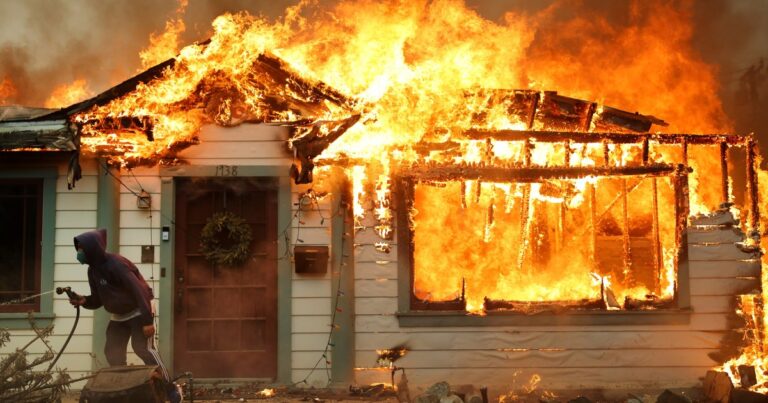The Rise of Unlicensed Insurance Companies: A Growing Concern for Consumers
In recent years, the landscape of the insurance market has been dramatically shifting. As traditional insurance companies are retreating for various reasons including economic instability and increased claims, unlicensed insurance companies are stepping in to fill this vacuum. This transition has raised several eyebrows among consumer advocates, who express growing concern about the adequacy and reliability of these providers.
Consumer Warnings from Advocates
Amy Buck, the executive director of the nonprofit organization United Policyholders, has been particularly vocal about these changes. She has openly stated that until the crisis emerged, she would never have advised consumers to seek home insurance through surplus insurance companies. “I didn’t even recommend that they consider it,” she remarked. However, the severity of the current situation has compelled some to explore alternatives they once deemed unsuitable. Buck’s sentiment epitomizes the dilemma facing many consumers—when conventional options deplete, the search for alternatives intensifies, but at what cost?
Understanding Risks with Surplus Insurance Providers
Advocates like Buck have legitimate concerns regarding several risks associated with unlicensed insurance providers. The absence of safety nets is perhaps the chief worry. Without regulatory oversight, these companies possess the autonomy to implement unregulated rate hikes, which could impose dramatic financial burdens on consumers. Additionally, there are potentially bizarre exclusions that could leave policyholders exposed, such as disproportionately high deductions for specific events like wildfires. This unpredictability poses a significant risk for homeowners—would-be policyholders must diligently assess if the trade-offs are worth the risk involved.
Conducting Thorough Research
In light of these concerns, United Policyholders recommends that consumers who find themselves unable to secure traditional insurance options delve deeply into research. They stress the importance of understanding the differences between the Fair Access to Insurance Requirements (FAIR) plans and excess line options. Evaluating these options side by side allows consumers to make informed decisions. This includes scrutinizing coverage specifics, policy exclusions, and potential financial ramifications of each option.
Evaluating the Financial Stability of Providers
Furthermore, while surplus line carriers may offer broader coverage compared to a basic FAIR plan, consumers should go beyond surface-level assessments. It’s crucial to check the financial ratings of these unlicensed insurers through agencies like AM Best. Understanding a provider’s financial stability is essential for ensuring that they can meet their obligations in times of crisis, such as after a natural disaster or major property damage.
Reassurances from Industry Experts
Despite the skepticism surrounding unlicensed insurance companies, some industry experts maintain a less alarmist perspective. Janet Lewis, communications director for the Insurance Information Institute, notes that there have been no reported bankruptcies of unlicensed carriers in California. She describes these companies as “usually very sound and stable” and asserts that they play a vital role in the state’s insurance market. This indicates that while concerns are valid, there is also a degree of stability within this segment that consumers may find reassuring.
Surge in Surplus Line Transactions
Supporting Lewis’s assertion is the notable increase in surplus line transactions, particularly in California. The number of transactions surged from 50,372 in 2023 to 164,930 in 2024, as reported by the California Surplus Line Association. This marked rise illustrates not only a growing reliance on these unlicensed insurers but also reflects the changing dynamics of the insurance industry as a whole. Furthermore, the number of surplus line carriers writing homeowners insurance has also seen significant growth, from 102 in 2015 to 159 in 2024, demonstrating a realignment of the insurance marketplace in response to the existing demands.
Conclusion
The insurance landscape is evolving, with unlicensed insurance providers gaining traction as traditional options wane. While they present an important alternative for consumers in desperate times, there are inherent risks that cannot be ignored. Diligent research and an understanding of the insurance market are more crucial than ever for homeowners navigating this shift to ensure they find reliable coverage tailored to their needs. As the industry continues to change, both consumer advocates and industry insiders stress the importance of being informed and vigilant.
FAQs
What are surplus line insurance companies?
Surplus line insurance companies are unlicensed carriers that can provide coverage where traditional insurers have withdrawn. They are regulated differently and may offer more specialized or higher-risk coverage options.
Why have traditional insurance companies retreated?
Traditional insurance companies have retreated due to various factors, including an increase in claims, economic uncertainty, and challenges posed by natural disasters, leading them to reassess the viability of offering certain coverages.
What should consumers look for when considering unlicensed insurance providers?
Consumers should research the financial stability of the provider, understand the specifics of the policy offerings, compare them to traditional options, and thoroughly assess any potential exclusions or rate hikes.
Are unlicensed insurance companies reliable?
While some unlicensed carriers have demonstrated stability and soundness, consumers should conduct their due diligence to evaluate each provider’s financial strength and coverage specifics before proceeding.
What is a FAIR plan?
The FAIR plan is a state-sponsored insurance program designed to provide coverage for individuals who have difficulty obtaining homeowners insurance in the private market, usually due to high-risk factors. While it is regulated, it often offers minimal coverage options compared to surplus lines.



